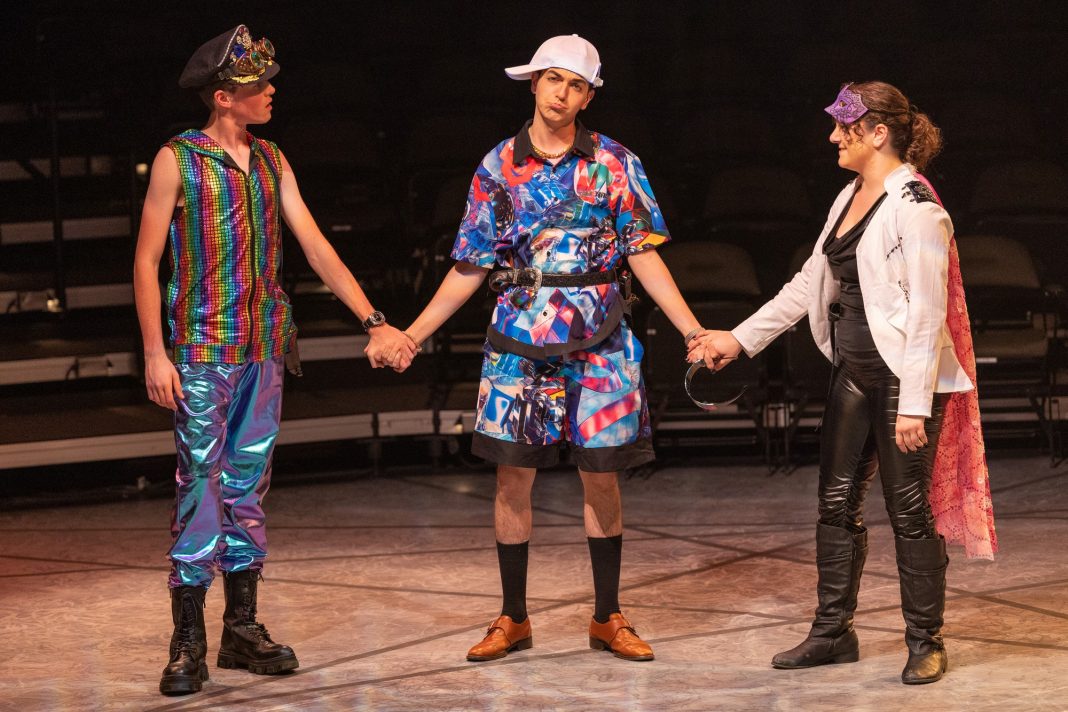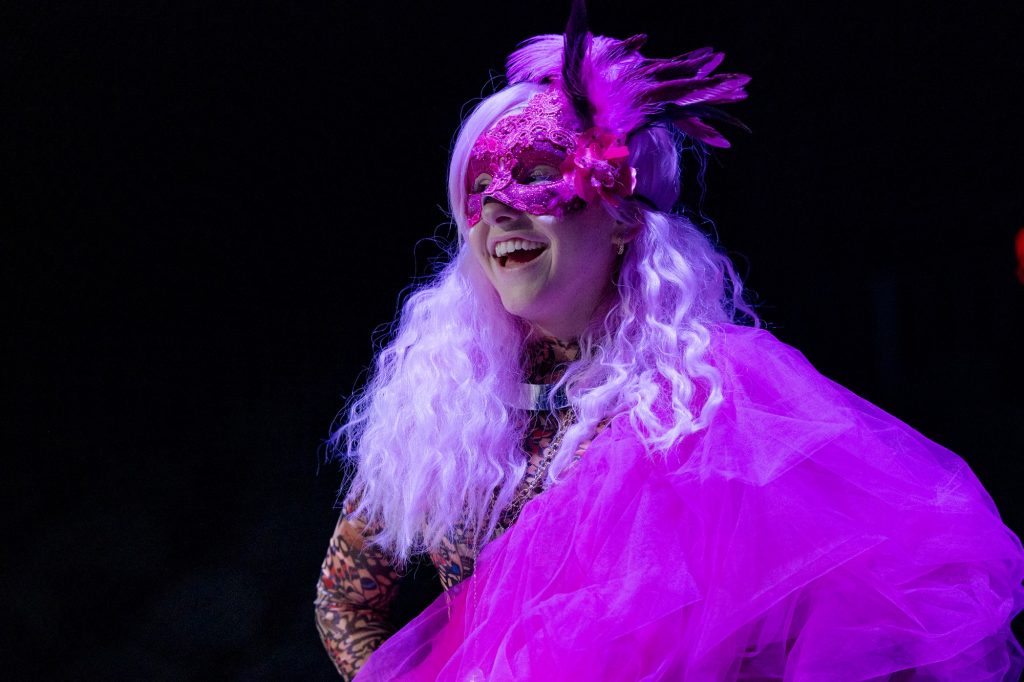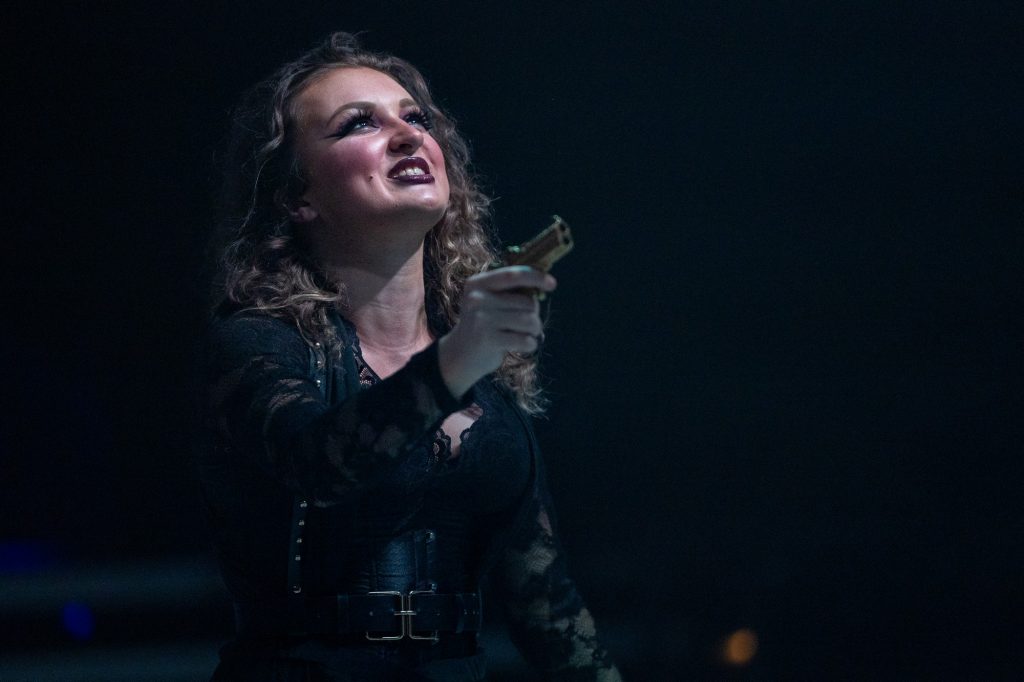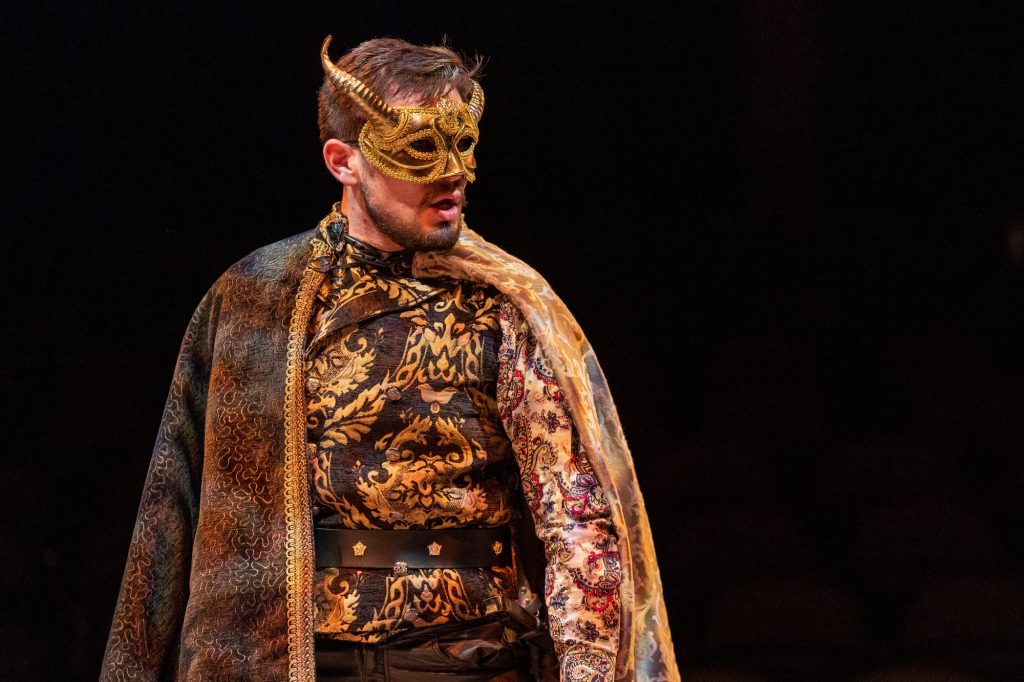
Patterns of purple LED lights flashed on the stage, a smoky haze filled the room and thunderous electronic music burst through the silence as anticipation reached its peak.
This week, the Jerry Herman Ring Theatre kicked off their spring program with a futuristic take on Aphra Behn’s 17th century play “The Rover.” The play takes place in Naples, Italy during Carnival and follows the stories of a group of young women and men looking for love — and a little bit of fun.
While maintaining the original dialogue’s traditional style, the production propelled the story into the future, exchanging 1677 Neapolitan Carnival music for EDM and traditional dress for costumes fit for a rave. The fusion between archaic language and modern music and dress was initially jarring. It did, however, make sense considering the themes tackled in the play.
Aphra Behn, the first female playwright in the English language, laced this play with clear feminist undertones and subject matter that is equally as relevant today as it was during her lifetime. Behn addressed female social, romantic, and sexual liberation along with chauvinism and sexual violence. The playwright also called out toxic masculinity and questioned the patriarchal society in which we still live today.
Transplanting the story into the future was not just a way to modernize the writing. It really was a means to demonstrate the continuity of the play’s themes. Women still struggle to escape the control of a male-dominated social system, fight for our voices to be heard and experience predation at the hands of men.
The alteration of the character Belvile from male to female also helped bring the story into the future. Played by senior BFA musical theater major Tobi Baisburd, Belvile was originally written as a male soldier who had met the love of his life, Florinda, played by junior BFA musical theater major Eleanor Parks, while at war.

While LGBTQIA+ people undoubtedly existed when “The Rover” was written, homosexuality was a crime in 17th century England and thus, rarely appeared in literature and entertainment. Making Belvile a woman in this contemporary adaptation reinforces the setting change and implies that intolerance for the LGBTQIA+ community is still prevalent today.
Florinda’s brother Don Pedro, played by junior BFA musical theater major Christian Miller, does not approve of her relationship with Belvile. While in the context of the story his disapproval stems from Belvile’s lack of financial means, this disapproval also reflects the modern struggle countless LGBTQIA+ people endure to win their family’s support.
Overall, the play evoked thought and emotion. The audience remained invested in the characters throughout the play, dancing along to the thumping EDM, gasping at the events unfolding before them and cheering when the women finally fought back. “The Rover” was well executed by all, but a few performances stood out.

Parks’ portrayal of Florinda was outstanding. She dug deep into Florinda’s character and her onstage connection with Baisburd breathed life into Florinda and Belvile’s love. Furthermore, her performance felt terrifyingly real, evoking fear in the audience who looked on with wide-eyed horror.
Davis Parks, a junior in the musical theater program, as Willmore, the titular “Rover,” also gave an excellent performance. Willmore antagonized Florinda twice and served as proof that the “womanizer” is as old as time. Parks also managed to somewhat redeem Willmore at the end, a feat I didn’t think possible.
Senior BFA musical theater major Leonardo Espinosa gave yet another strong performance as Don Antonio, the man set to marry Florinda. Espinosa brought his signature larger-than-life energy and booming voice — always a crowd pleaser — but his fight scenes stood out the most. Assisted by intimacy and fight director Burton Tedesco, Espinosa demonstrated some of the best stage fighting I’ve ever seen.

Moretta, played by senior musical theater major Aden Siegel, was one of my favorite characters. The costume, hair, and makeup were dazzlingly glamorous, and Siegel’s performance was sassy, witty, and just delightful.
Lastly, junior film production major Chiara Padejka’s performance as Valeria deserves recognition as one of the standouts. Although Valeria was not as major a role as others, Padejka executed her dry wit, sarcasm, and female defiance beautifully.
“The Rover” is ultimately about love and lust, female disobedience and empowerment, femininity and masculinity and everything in between. It’s about what it means to be human and is a must-see.
“The Rover” is playing at The Ring until March 10, and student tickets are free on March 8. For more information on “The Rover,” read this preview.






